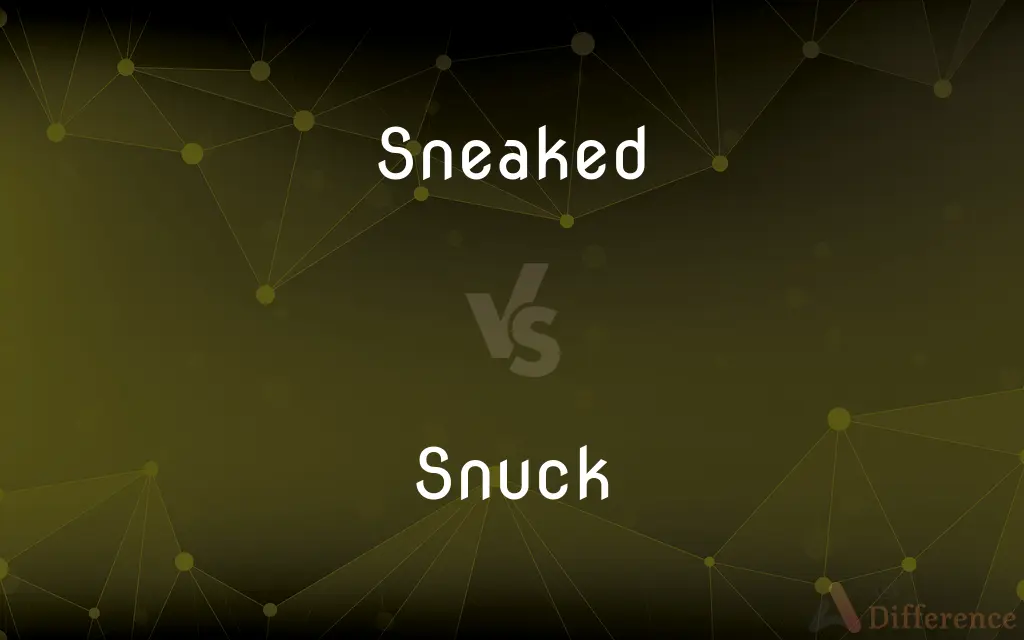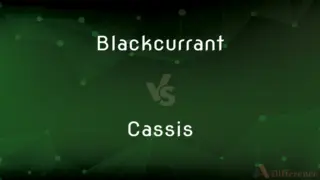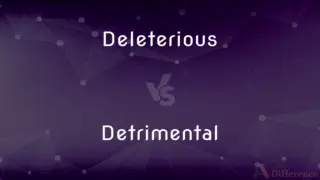Sneaked vs. Snuck — What's the Difference?
By Tayyaba Rehman — Updated on October 30, 2023
"Sneaked" and "snuck" are both past tense forms of "sneak," with "sneaked" being traditionally correct but "snuck" widely accepted in informal use.

Difference Between Sneaked and Snuck
Table of Contents
ADVERTISEMENT
Key Differences
"Sneaked" is the traditional past tense and past participle form of "sneak." It's widely accepted in formal writing and speech. Conversely, "snuck" emerged in the 19th century as a colloquial, informal alternative. Both words imply moving quietly or stealthily, but "sneaked" carries a more formal tone.
In literature and academic writing, "sneaked" is often preferred to maintain formality. "Snuck," while commonly used in everyday speech and informal writing, might be considered too casual for some formal contexts. Each word, though similar in meaning, aligns with different language registers.
Linguistically, "sneaked" follows the regular pattern of forming the past tense by adding -ed to the base verb. "Snuck," however, is an irregular formation, deviating from this pattern. Despite its irregularity, "snuck" has gained popularity and acceptance, especially in American English.
Usage varies by region and preference. Some English speakers exclusively use "sneaked," while others prefer "snuck." It's important to note that neither form is incorrect, but awareness of the audience and context can guide the choice between "sneaked" and "snuck."
In conclusion, "sneaked" and "snuck" both indicate moving in a stealthy manner but differ in formality and linguistic regularity. While "sneaked" aligns with traditional, formal English, "snuck" is more colloquial and widely accepted in informal contexts.
ADVERTISEMENT
Comparison Chart
Form
Regular past tense
Irregular past tense
Formality
More formal and traditional
More informal and colloquial
Linguistic Pattern
Follows standard -ed ending
Deviates from standard pattern
Usage Context
Preferred in formal writing
Common in everyday speech
Emergence
Historically older form
Emerged in the 19th century
Compare with Definitions
Sneaked
Did something surreptitiously.
She sneaked a cookie from the jar.
Snuck
Secretly obtained or done.
She snuck a peek at the surprise gift.
Sneaked
Moved stealthily.
She sneaked out of the house at midnight.
Snuck
Did something surreptitiously.
He snuck a note into her locker.
Sneaked
Crept quietly.
The cat sneaked up on the unsuspecting bird.
Snuck
Entered or left furtively.
They snuck into the concert backstage.
Sneaked
Secretly obtained or done.
He sneaked a glance at the confidential documents.
Snuck
Moved stealthily.
He snuck out to meet his friends.
Sneaked
Entered or left furtively.
They sneaked into the movie theater without paying.
Snuck
Crept quietly.
The thief snuck through the dark alley.
Sneaked
To go or move in a quiet, stealthy way.
Snuck
A past tense and a past participle of sneak. See Usage Note at sneak.
Sneaked
To behave in a cowardly or servile manner.
Snuck
Simple past tense and past participle of sneak
I snuck into the theater because the movie had already started.
Sneaked
To move, give, take, or put in a quiet, stealthy manner
Sneak candy into one's mouth.
Sneaked a look at the grade sheet.
Sneaked
A person regarded as stealthy, cowardly, or underhanded.
Sneaked
An instance of sneaking; a quiet, stealthy movement.
Sneaked
(Informal) A sneaker.
Sneaked
Carried out in a clandestine manner
Sneak preparations for war.
Sneaked
Perpetrated without warning
A sneak attack.
Sneaked
Simple past tense and past participle of sneak
Common Curiosities
Can "snuck" be used in formal writing?
It's generally less preferred in formal writing.
Is "snuck" a recent addition to the language?
It emerged in the 19th century.
Is "sneaked" the only correct past tense of "sneak"?
No, both "sneaked" and "snuck" are acceptable.
Do "sneaked" and "snuck" have the same meaning?
Yes, they both mean to move stealthily.
Is "snuck" accepted by all dictionaries?
Most modern dictionaries accept "snuck" as an alternative.
Do "sneaked" and "snuck" follow the same grammatical rules?
They differ, as "sneaked" follows regular tense formation, while "snuck" does not.
Are there any synonyms for "sneaked" and "snuck"?
Yes, words like "slipped," "crept," or "tiptoed."
Can "sneaked" and "snuck" be used in past participle form?
Yes, both can be used as past participles.
Can "sneaked" be used in informal contexts?
Yes, it can be used in both formal and informal contexts.
Is "snuck" more common in American or British English?
"Snuck" is more common in American English.
Are there regions where "snuck" is still considered incorrect?
Some traditionalists or formal contexts may prefer "sneaked."
Did "sneaked" always exist as the past tense of "sneak"?
Yes, it's the original past tense form.
Has "snuck" increased in popularity?
Yes, especially in spoken and informal English.
Is "snuck" considered colloquial or slang?
It's colloquial but not slang; it's widely accepted in informal use.
Can "sneaked" and "snuck" be used interchangeably?
In most cases, yes, depending on formality.
Share Your Discovery

Previous Comparison
Blackcurrant vs. Cassis
Next Comparison
Deleterious vs. DetrimentalAuthor Spotlight
Written by
Tayyaba RehmanTayyaba Rehman is a distinguished writer, currently serving as a primary contributor to askdifference.com. As a researcher in semantics and etymology, Tayyaba's passion for the complexity of languages and their distinctions has found a perfect home on the platform. Tayyaba delves into the intricacies of language, distinguishing between commonly confused words and phrases, thereby providing clarity for readers worldwide.
















































